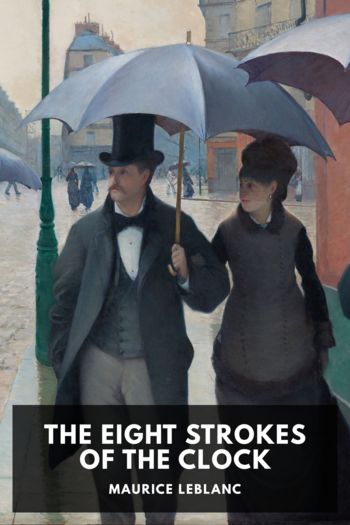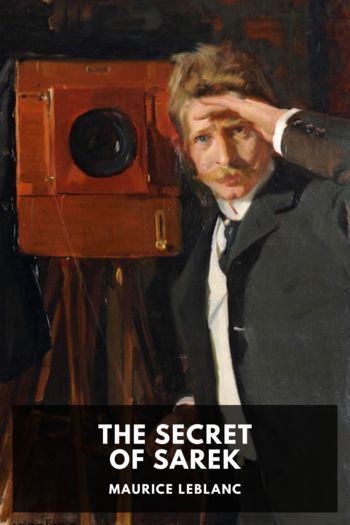The Eight Strokes of the Clock - Maurice Leblanc (reading in the dark .TXT) 📗

- Author: Maurice Leblanc
Book online «The Eight Strokes of the Clock - Maurice Leblanc (reading in the dark .TXT) 📗». Author Maurice Leblanc
“Chance, which has placed me in possession of part of the truth, will enable me to save you both, if you are willing to assist me with a frank explanation that will give me the particulars which I still need. Each of you knows the danger in which she stands, because each of you is conscious in her heart of the evil for which she is responsible. But you are carried away by hatred; and it is for me to see clearly and to act. The examining-magistrate will be here in half-an-hour. By that time, you must have come to an agreement.”
They both started, as though offended by such a word.
“Yes, an agreement,” he repeated, in a more imperious tone. “Whether you like it or not, you will come to an agreement. You are not the only ones to be considered. There are your two little daughters, Madame d’Ormeval. Since circumstances have set me in their path, I am intervening in their defence and for their safety. A blunder, a word too much; and they are ruined. That must not happen.”
At the mention of her children, Madame d’Ormeval broke down and sobbed. Germaine Astaing shrugged her shoulders and made a movement towards the door. Rénine once more blocked the way:
“Where are you going?”
“I have been summoned by the examining-magistrate.”
“No, you have not.”
“Yes, I have. Just as all those have been who have any evidence to give.”
“You were not on the spot. You know nothing of what happened. Nobody knows anything of the murder.”
“I know who committed it.”
“That’s impossible.”
“It was Thérèse d’Ormeval.”
The accusation was hurled forth in an outburst of rage and with a fiercely threatening gesture.
“You wretched creature!” exclaimed madame d’Ormeval, rushing at her. “Go! Leave the room! Oh, what a wretch the woman is!”
Hortense was trying to restrain her, but Rénine whispered:
“Let them be. It’s what I wanted … to pitch them one against the other and so to let in the daylight.”
Madame Astaing had made a convulsive effort to ward off the insult with a jest; and she sniggered:
“A wretched creature? Why? Because I have accused you?”
“Why? For every reason! You’re a wretched creature! You hear what I say, Germaine: you’re a wretch!”
Thérèse d’Ormeval was repeating the insult as though it afforded her some relief. Her anger was abating. Very likely also she no longer had the strength to keep up the struggle; and it was Madame Astaing who returned to the attack, with her fists clenched and her face distorted and suddenly aged by fully twenty years:
“You! You dare to insult me, you! You after the murder you have committed! You dare to lift up your head when the man whom you killed is lying in there on his deathbed! Ah, if one of us is a wretched creature, it’s you, Thérèse, and you know it! You have killed your husband! You have killed your husband!”
She leapt forward, in the excitement of the terrible words which she was uttering; and her fingernails were almost touching her friend’s face.
“Oh, don’t tell me you didn’t kill him!” she cried. “Don’t say that: I won’t let you. Don’t say it. The dagger is there, in your bag. My brother felt it, while he was talking to you; and his hand came out with stains of blood upon it: your husband’s blood, Thérèse. And then, even if I had not discovered anything, do you think that I should not have guessed, in the first few minutes? Why, I knew the truth at once, Thérèse! When a sailor down there answered, ‘M. d’Ormeval? He has been murdered,’ I said to myself then and there, ‘It’s she, it’s Thérèse, she killed him.’ ”
Thérèse did not reply. She had abandoned her attitude of protest. Hortense, who was watching her with anguish, thought that she could perceive in her the despondency of those who know themselves to be lost. Her cheeks had fallen in and she wore such an expression of despair that Hortense, moved to compassion, implored her to defend herself:
“Please, please, explain things. When the murder was committed, you were here, on the balcony. … But then the dagger … how did you come to have it … ? How do you explain it? …”
“Explanations!” sneered Germaine Astaing. “How could she possibly explain? What do outward appearances matter? What does it matter what anyone saw or did not see? The proof is the thing that tells. … The dagger is there, in your bag, Thérèse: that’s a fact. … Yes, yes, it was you who did it! You killed him! You killed him in the end! … Ah, how often I’ve told my brother, ‘She will kill him yet!’ Frédéric used to try to defend you. He always had a weakness for you. But in his innermost heart he foresaw what would happen. … And now the horrible thing has been done. A stab in the back! Coward! Coward! … And you would have me say nothing? Why, I didn’t hesitate a moment! Nor did Frédéric. We looked for proofs at once. … And I’ve denounced you of my own free will, perfectly well aware of what I was doing. … And it’s over, Thérèse. You’re done for. Nothing can save you now. The dagger is in that bag which you are clutching in your hand. The magistrate is coming; and the dagger will be found, stained with the blood of your husband. So will your pocketbook. They’re both there. And they will be found. …”
Her rage had incensed her so vehemently that she was unable to continue and stood with her hand outstretched and her chin twitching with nervous tremors.
Rénine gently took hold of Madame d’Ormeval’s bag. She clung to it, but he insisted and said:
“Please





Comments (0)